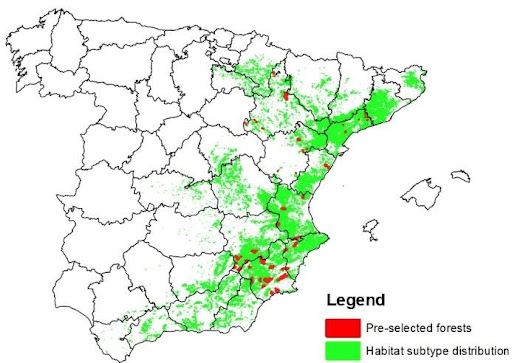PROJECT DESCRIPTION
The LIFE ADAPT-ALEPPO Project (LIFE20 CCA/ES/001809) – “Adaptive management of Mediterranean Pinus halepensis forests in the face of climate change”, is a project carried out in Spain, belonging to the 2020 call of the LIFE Program, as part of the Climate Action subprogram, within the vulnerability assessment and adaptation strategies sector.
Its main objective is the development of new tools for the adaptation of Iberian Aleppo pine forests (subtype 42.841 of Habitat 9540 of the Habitats Directive, Annex I) to climate change, as well as their demonstrative application. These tools will focus on the early detection of decay processes and on improving the resilience of this ecosystem by increasing its vigor, its ability to adapt to climatic aridification and the ability to recover its functions after natural disturbances.
- Duration: September 1, 2021 – August 31, 2025 (4 years)
- Budget:
- Total budget: €2,606,279
- EU Financial Contribution: €1,433,268 (54.99%)
SPECIFIC OBJECTIVES
The achievement of the general objective of the project will depend on the fulfillment of the following specific objectives:
O1 – Develop a habitat suitability map and implement a tool to detect decline processes through remote sensing.
O2 – Implement and monitor assisted migration actions aimed at improving the ecosystem’s capacity to adapt to climatic aridification.
O3 – Implement and monitor silvicultural treatments aimed at improving vitality and reducing the effects of reduced water availability.
O4 – Implement and monitor silvicultural treatments to improve structural and floristic heterogeneity and increase the diversity of responses to disturbances.
O5 – Implement and monitor adaptive management techniques to improve the resilience and adaptive capacity of post-fire regeneration of Aleppo pine.
O6 – Develop management tools and transfer them to the forest administration, to promote the integration of climate change adaptation in national and regional forest management regulations.
O7 – Develop monitoring tasks to evaluate the success and impact of the project.
O8 – Transfer the techniques and tools implemented to the main local actors and those from the distribution area of the European Aleppo pine (Balearic, French and Italian), in order to improve the management and long-term conservation of the Aleppo pine habitat in the South of Europe.
EXPECTED RESULTS
R1 – Evaluation of the vulnerability of the habitat through the development of suitability maps and the diagnosis of forest decline processes. These cartographic products will be implemented in a cartographic viewer with the possibility of downloading maps, allowing forest managers to have this information to design adaptation strategies and plan adaptive forest management actions in the affected areas.
R2 – Technical guides for adaptive forest management of Aleppo pine forests in the face of climate change, based on the work carried out in actions A, C and D. The transfer of innovative adaptation solutions to forest managers throughout the area of distribution of the Aleppo pine will mean a paradigm shift towards adaptive forest management of these habitats:
– Technical guides for forest restoration of the Aleppo pine habitat using assisted migration.
– Technical guides for ecohydrological forestry adapted to the variety of sites and bioclimatic conditions of the Aleppo pine in the Iberian Peninsula.
– Technical guides for the structural and floristic diversification of Iberian Aleppo pine forests.
– Technical guides for the adaptive management of post-fire regeneration.
R3 – Implementation of 42 demonstration plots (108 ha) and monitoring of them and of at least 20 other actions previously implemented in forests distributed in 3 bioclimatic regions. Depending on the specific characteristics of each action C, different quantitative objectives will be achieved (see KPIs) in relation to: the improvement of the vitality and stability of trees, the reduction of vulnerability to forest fires, the success of natural regeneration and/or artificial, the increase in floristic and structural diversity and the increase in the balance of blue water.
R4 – Transfer and promotion of the use of these adaptive management tools and techniques
(replicability) to facilitate its use by forest owners and managers at local, regional and southern European scales.
R5 – Increase in the level of knowledge and awareness of the actors involved and the general public about the problem addressed and the solutions provided by the project. The participation of interest groups will be ensured by involving them in management decisions.
ACTIONS

PROJECT CONSORTIUM
The LIFE ADAPT-ALEPPO project is developed by a consortium of public and private organizations in the forestry field related to climate change. This consortium, led by the consulting firm INGENIERÍA DEL ENTORNO NATURAL, is made up of the following partners:
- Coordinating Beneficiary: Natural Environment Engineering (IDEN)
- Associated beneficiaries:
- AGRESTA Cooperative Society (AGRESTA)
- General Directorate of the Natural Environment of the CARM (DGMN)
- University of Castilla-La Mancha (UCLM)
- Polytechnic University of Valencia (UPV)
- University of Lleida (UdL)
REGIONS WHERE THE PROJECT WILL BE IMPLEMENTED
The geographical scope of the project will cover the potential area of distribution of the Iberian Aleppo pine forest (subtype 42.841 of Habitat 9540 of the Habitats Directive, Annex I), including the Mediterranean slopes of the Catalan mountains and the Iberian System, the Ebro basin and the prebéticas mountain ranges. This will facilitate an integrated implementation, involving the main stakeholders responsible for regulating forest management throughout the area.
The regions where the project will be implemented mainly are:
- Murcia
- Castilla la Mancha
- Catalonia
- Aragon
- Valencian Community

